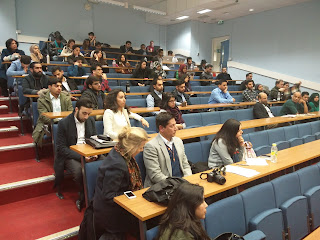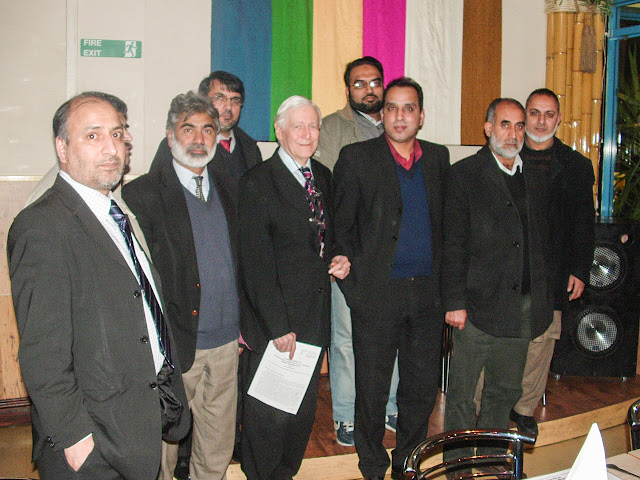Below is the text of the paper presented by Prof Zafar Khan during a Seminar on Kashmir Issue held at Kings College London entitled “Jammu Kashmir Conflict- Conflicting Perspectives” on 18 Feb 2016
*By Zafar Khan
Chairman:
Dr Dibyesh Anand, I wish to extend my thanks to you and the organisers of this seminar entitled: Jammu Kashmir Conflict: Conflicting Perspectives.
Right at the outset we must acknowledge that the biggest danger to peace between India and Pakistan and the wider region, is the unresolved issue of Jammu Kashmir and its future political status.
Currently Jammu Kashmir-generally referred to as Kashmir, has a huge military presence on both sides of the Line of Control-LoC- that forcibly divides it between India and Pakistan.
India has its Norther Military Command situated in Kashmir, comprising of at least three corps of the Indian army. This huge military force is supported by thousands of paramilitary battalions that make a combined force well in excess of half a million personnel.
What is most disturbing however is the impunity with which these Indian military and para military forces operate against civilians, and have done so since 1988.
Chairman, I do not want to dwell on this most saturated of military deployments anywhere in the world, and its impact on normal human activity in Kashmir, suffice to say that the mere presence of the military in such huge numbers in itself, is a major impediment to peace and normal human social and political interaction. While this is true both in the rural and urban areas within Indian held Jammu Kashmir, it is also the reality across both sides of the Line of Control.
Without intending to appear ill-intentioned to one or the other side Chairman, it is certainly compelling to conclude that the sheer presence of hundreds of thousands of soldiers, deployed eye-ball to eye ball by two powerful nuclear states, across the LoC, cannot be a conducive factor for a peaceful future. Peace will not appear in Kashmir one day simply because we the Kashmiris desire it, and desire we do!
With your indulgence Chairman, I would like to remind the audience that for over twenty years now, pro freedom Kashmiri leadership adopted a peaceful and non-violent struggle for self-determination and reunification of Kashmir.
The Indian government however, remains as intransigent as ever, and confines pro freedom and reunification leadership either in custody or under house arrest. Mr Yasin Malik the Chairman of Jammu Kashmir Liberation Front-JKLF- for example over the past few months alone, has been beaten up, put under arrest dozens of times and prevented from political and social interaction with the people. Indian authorities use military and paramilitary forces as well as the local police to prevent him from exercising his fundamental democratic right of free expression and assembly. Even as I speak Mr Yasin Malik is hospitalised while under custody.
Chairman, Kashmir must not be seen as a territorial dispute between India and Pakistan nor must it be considered as a domestic matter of India as so often Indian governments claim. As we know, the genesis of Kashmir dispute, begins at least at the international level, with India taking the matter to the United Nations Security Council on 1 January 1948.
Not only did the UN pass many resolutions on the Kashmir issue, its UN Military Observer Group on India and Pakistan-UNMOGIP- personnel are operational in the territory under resolution 47 of April 1948.
Solemn commitments were made and pledges were given by India and supported by the US, UK and other major powers, so that the dispute over the Kashmir issue could be resolved in accordance with the wishes of the people.
Chairman, I am conscious of the time and will therefore not go in to details of the Kashmir conflict, and how for 68 years India and Pakistan have utterly failed to resolve it.
Who can begrudge the 20 million Kashmiris therefore, for feeling betrayed, at the indifference and abandonment of their basic human right- the right to national self-determination and the right to reunification- a right that not only India but all major powers recognised.
India for example in one of its many solemn pledges on Kashmir declared:
“that the question of Kashmir’s future status vis-a-vis its neighbours and the world at large and the question on whether Kashmir should withdraw from her accession to India, and either accede to Pakistan or remain independent with a right to claim admission as a member of the United Nations all this we have recognised to be a matter for unfettered decision by the people of Kashmir after normal life is restored to them” UNSC document Agenda 227.
Unfortunately Chairman, India has completely and blatantly reneged on the above and many other commitments, and has consistently prevaricated over its bilateral Shimla Accord of 1972 with Pakistan, in which both countries agreed to resolve the conflict in accordance with the wishes of the people.
Chairman without a shadow of doubt peace is the only option for Kashmir, and Kashmiris are ready to play their part in the process. Unfortunately it seems that Kashmiris do not have partners to engage with for a just and peaceful solution of the future political status of their country. In fact the pro freedom leadership would want Kashmir to be the common ground for peace making in the region.
Kashmir therefore in our view, must become a bridge of friendship and lasting prosperity for India, Pakistan, the 20 million inhabitants of Kashmir, and the whole region of south, south west and central Asia.
Chairman, peace-making is a serious process, and as such cannot be instituted by a single entity or by India and Pakistan whose hostility against each other is embedded in their history. However they must recognise the futility of perpetual conflict and uncertainty in the region. Over the past four decades we have seen what has become of the Shimla Accord, let alone the many UN resolutions and the promised plebiscite on the future status of the forcibly divided Jammu Kashmir state.
Chairman, India and Pakistan seemingly have decided to resume their bilateral interaction with the unexpected stop-over in Lahore by Mr Modi to meet Mr Nawaz Sharif, in December 2015. Pathankot incident however, appears to have jeopardised the intended course of interaction that the two countries may have envisaged in their “Compressive Dialogue” process.
While any rapprochement between India and Pakistan is a step in the right direction, we do however have strong reservations if Kashmir and Kashmiris are not included in such a dialogue process. This quite clearly appears to be the case in our view, in the proposed dialogue process between the two countries. Inevitably therefore we will not support an Indo- Pak dialogue process that excludes Kashmir and Kashmiris.
In conclusion Chairman, an opportunity has arisen for both Mr Modi and Mr Nawaz Sharif, to secure an historic peace deal for our time and all times to come. Future prosperity and wellbeing of 1.5 billion people of the sub-continent depends on just such a peaceful resolution of the Kashmir conflict. A resolution that enables 20 million Kashmiris to exercise their unfettered, democratic right of self-determination. In order to secure a lasting peace in the region, both countries must allow participation and representation of pro azadi and anti-status quo Kashmiri leadership in the dialogue process.
*Zafar Khan is head of Diplomatic Bureau of the JKLF.
--


















